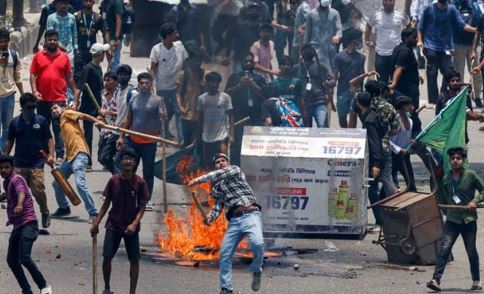DHAKA – Student leaders in Bangladesh rallied citizens on Saturday to participate in a nationwide civil disobedience campaign, following a deadly police crackdown on protesters that has sparked growing discontent against Prime Minister Sheikh Hasina’s government.
The unrest began last month in response to civil service job quotas, leading to violent clashes that resulted in over 200 fatalities—some of the most severe violence during Hasina’s 15-year rule.
While troop deployments temporarily restored order, large crowds filled the streets after Friday prayers, responding to calls from student leaders for the government to make further concessions.
The group Students Against Discrimination, which organized the initial protests, urged fellow citizens to commence a full-scale non-cooperation movement starting Sunday.
“This will include halting tax and utility bill payments, strikes by government employees, and stopping overseas remittances through banks,” said Asif Mahmud, a representative of the group.
Mahmud and other student leaders announced plans for another series of nationwide rallies on Saturday. “Don’t stay at home. Join the nearest protest march,” he encouraged on Facebook.
The students are demanding a public apology from Hasina for the violence of the previous month and the removal of several ministers. They also insist that schools and universities, which were closed during the unrest, be reopened.
Many protesters have gone further, calling for Hasina to resign. The 76-year-old leader has been in power since 2009 and won her fourth consecutive term in January during an election that lacked genuine opposition.
Her administration has faced accusations from human rights organizations of abusing state institutions to maintain power and suppress dissent, including reports of extrajudicial killings of opposition activists.
The protests originated in early July over the reintroduction of a quota system that reserved more than half of all government jobs for specific groups—an initiative that has since been scaled back by the country’s top court. With around 18 million young Bangladeshis unemployed, the move frustrated graduates grappling with a severe job crisis.
The demonstrations remained mostly peaceful until police and pro-government student groups launched attacks on protesters. In response, Hasina’s government implemented a nationwide curfew, deployed troops, and suspended mobile internet services for 11 days to restore order.
International condemnation of the government’s actions has grown, with European Union foreign policy chief Josep Borrell recently calling for an investigation into the “excessive and lethal force used against protesters.”
Home Minister Asaduzzaman Khan claimed last weekend that security forces acted with restraint but had to “open fire” to protect government buildings.
The United Nations said at least 32 children were among those killed in the violence last month.










